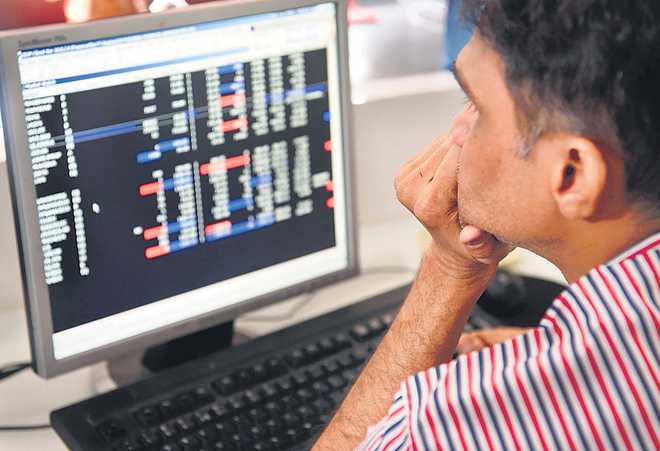
Mythili Bhusnurmath
Economist and former Central Banker
WHAT goes up, must come down, what must rise, must fall', sang Alan Parsons, the English songwriter and musician, better known for his production of the show-stopping Beatles' album, Abbey Road. Parsons certainly did not have stock markets on his mind when he wrote the song! Nor, presumably, did market investors believe stock markets could fall!
On the contrary! Despite saner voices cautioning investors that markets were over-valued and out of sync with underlying macro-economic fundamentals, stock market aficionados' faith in the markets remained undiminished through most of the last two years. Whether in India, where the Bombay Stock Exchange's (BSE) Sensex rose close to 30 per cent in 2017, or in the US where the Dow Jones Industrial Average, a measure of stock market valuations, rose 2 per cent, equity markets were on roll.
It took the Dow 14 years to climb from 10,000 to 15,000, but just three and a half years to reach 20,000 in 2017. Likewise, the Sensex rose 1,000 points in just five sessions to touch 36,000 in January 2018. But all that changed in the opening days of February 2018. Following upbeat US macroeconomic data, raising the possibility of faster interest rate hikes, the US Dow Jones fell 1,175 points on Monday, February 5, the largest single-day fall ever in its history. Last Monday's fall followed losses in the closing days of the previous week, bringing total losses in US stocks to $1 trillion in the first five days of February.
As India, along with other emerging markets followed suit, analysts sprung into action, trying to make sense of the mayhem. Explanations abound —stronger-than-expected recovery in the US, change of guard at the US Federal Reserve with Jerome Powell taking over from Janet Yellen, sweeping tax cuts announced by President Trump, much more pro-business environment in the US, possible emergence of inflationary pressures and last, but not the least, markets correcting after running ahead of fundamentals.
We in India added our own spin to this story; Finance Minister, Arun Jaitley's Budget announcement of a tax on long-term capital gains. Though the tax was widely anticipated and in the event was fairly nominal — 10 per cent on capital gains of over Rs 1 lakh in a year, with a grandfathering clause that exempted gains till end January — market reaction was on predicted lines — an immediate fall, followed by recovery.
However, sanity lasted only for a day. After taking it on the chin on Budget day (February 1), the Sensex crashed 840 points the day after, the sharpest single-day fall in 15 months. As global markets, led by the US fell in the closing days of the week, India joined the 'party'. The rout continued; in just four trading sessions to Tuesday, February 6, the Sensex lost over 1,600 points. And though global markets recovered somewhat on Wednesday and Indian markets a day later, the writing on the wall is clear.
The Goldilocks days of plentiful liquidity, low interest rates and stock markets setting new records with every passing day are over. Globally, monetary policy is tightening. Bond yields have spiked across the world, including in India, where the yield on the benchmark 10-year GoI security has shot up close to 100 basis points (one basis point is .01) in a year.
What are the implications of all these developments for millions of retail investors in India who flocked to the equity market, enthused by the exceptional rally in valuations and falling returns on other asset classes like real estate, gold and bank deposits?
The biggest takeaway is that stock market investments are not risk-free. Risk and reward go hand-in-hand. Yes, regular investment in equities through the SIP (systematic investment plans) can protect investors from short-term volatility, but can never eliminate risk altogether.
Today there is undeniable nervousness that the global economy could be heading for another financial Armageddon. But for now those fears look overdone. The global economy is at the nascent stage of a recovery and in India too, there is reason to believe growth has bottomed-out. And though rising protectionism means coordinated action between countries of the kind seen in 2008 is almost ruled out if the world economy does go into another crisis, the fact that growth is below potential in many countries is reason for optimism.
In India, there is another positive. Last Wednesday's (February 7) decision by the Monetary Policy Committee to hold rates unchanged suggests a rare meeting of minds between the Union Finance Ministry and Mint Street. The Chief Economic Advisor, Arvind Subramanian, long a critic of RBI's interest rate policy, no longer expects it to cut rates. Speaking after the release of the Economic Survey, Subramanian observed the scope for monetary easing is now limited.
The RBI, likewise, chose to maintain status quo on rates when there might, arguably, have been a case to raise the policy repo rate from the present six percent. It also chose to retain its neutral policy stance, driven, perhaps, by the desire not to rock the boat at a time when markets are volatile. Any hike in the RBI repo rate would have added to the panic in the bond market. It would also have made government's borrowing programme difficult since higher yields translate into higher interest costs for the exchequer.
Given the not-so-cosy relationship between government and RBI under its three previous governors, Raghuram Rajan, D Subbarao and YV Reddy, the new bonhomie suggests a welcome maturing of the relationship.
As a business daily put it, 'the tone of the Economic Survey suggests that there will be greater consensus this year between the finance ministry and the central bank on monetary policy'.
And that augurs well for a country that desperately needs to shake off its growth lethargy and grow at a sustainable rate of at least eight per cent a year, if it is to lift its people out of poverty.



























